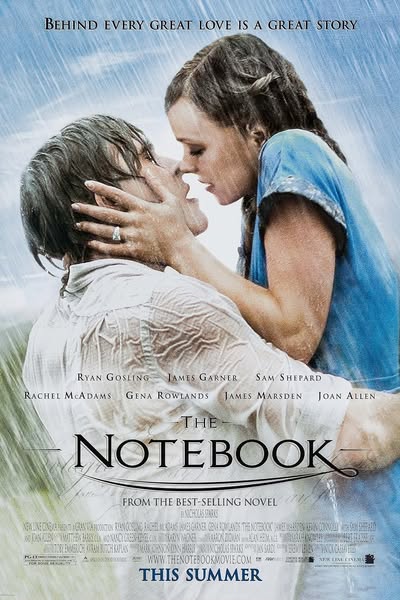The Notebook (2004)

The Notebook is a 2004 romantic drama directed by Nick Cassavetes, based on the novel by Nicholas Sparks. The film has become a cultural phenomenon, celebrated for its poignant exploration of love, memory, and the enduring power of relationships. Starring Ryan Gosling as Noah Calhoun and Rachel McAdams as Allie Nelson, the story unfolds across multiple timelines, weaving together themes of youthful passion and the trials of enduring love.
The narrative begins in a nursing home, where an elderly man reads a romantic story from his notebook to a woman suffering from Alzheimer’s. This story transports viewers back to the summer of 1940 in Seabrook, North Carolina, where young Noah and Allie meet. Despite coming from different social backgrounds—Noah is a working-class boy while Allie comes from a wealthy family—their attraction is immediate and intense. Their summer romance is filled with passion, laughter, and the kind of love that seems all-consuming.
However, their relationship faces significant obstacles, particularly the disapproval of Allie’s parents, who do not approve of Noah’s social standing. As the seasons change, so does their relationship, leading to a heartbreaking separation. The film poignantly captures the feelings of longing and heartbreak that accompany first love, illustrating how external circumstances can impact personal relationships.
As the story progresses, viewers witness the characters’ struggles with their choices and the passage of time. Allie eventually becomes engaged to another man, but she never forgets Noah. Fate intervenes years later when Allie sees an article about Noah restoring a historic plantation home, leading her to revisit their past. This reunion ignites long-buried feelings, forcing both characters to confront their unresolved emotions and the choices they’ve made.

Gosling and McAdams deliver powerful performances that breathe life into their characters. Their chemistry is palpable, capturing the essence of young love and the complexities of adult relationships. The film balances romantic idealism with the harsh realities of life, showcasing how love can endure despite the challenges of time and circumstance.
The cinematography by Robert Fraisse beautifully captures the lush landscapes of the South, enhancing the film’s romantic atmosphere. The sweeping shots of the countryside, combined with a tender score composed by Aaron Zigman, create an immersive experience that resonates emotionally with the audience. This visual and auditory combination reinforces the film’s themes of nostalgia and longing, making each moment feel significant.

The Notebook explores profound themes of love and memory, highlighting how relationships can shape our identities. The elderly couple’s story serves as a poignant reminder of the importance of love in our lives, even as memories fade. The film raises questions about the nature of commitment, fidelity, and the lengths one might go to preserve love against all odds.
Upon its release, The Notebook received mixed reviews from critics, but it resonated deeply with audiences, quickly becoming a beloved classic. Its portrayal of love—both young and mature—strikes a chord with viewers, making it a staple in the romantic film genre. The film’s emotional depth and relatability ensure that it remains a favorite for those seeking a heartfelt love story.

In conclusion, The Notebook is a beautifully crafted film that captures the essence of love, memory, and the enduring nature of relationships. With strong performances, stunning cinematography, and a compelling narrative, it stands as a testament to the power of love to transcend time and circumstance. The film invites viewers to reflect on their own relationships and the moments that define them, making it a timeless story that continues to resonate with audiences around the world. Ultimately, The Notebook serves as a reminder that true love can endure, even in the face of life’s greatest challenges.











